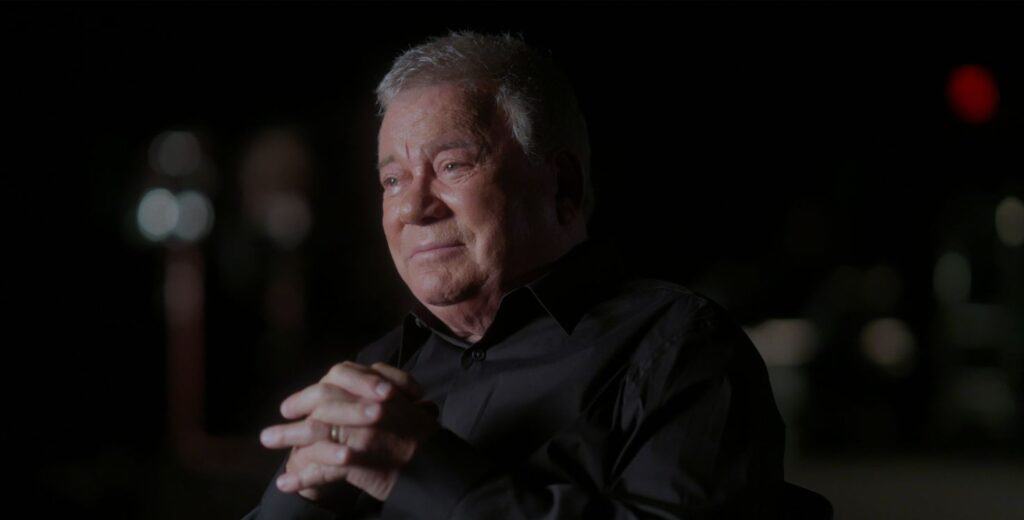William Shatner reflecting on his life, legacy, and message for the future in this unconventional documentary.
Last Updated on April 22, 2024
Synopsis: As an intimate portrait of William Shatner’s personal journey across nine decades of a boldly lived and fully realized life, William Shatner: You Can Call Me Bill strips away all the masks he has worn during his storied career to reveal the man behind it all.
Review: William Shatner is a legendary actor better known for his iconic performance as Captain James T. Kirk in the original Star Trek television series and films. He holds a unique place in Hollywood history. A fan favorite for over sixty years with a career on stage and screen as a writer and singer, and having traveled to space, Shatner’s legacy has built him a dedicated fanbase worldwide. Having written memoirs and shared his life story in many forms of media, You Can Call Me Bill is a unique documentary that does not follow the conventional format we have come to expect from a film chronicling the life of a famous person. More of a long-form meditation on his beliefs about life and our impact on the world, You Can Call Me Bill feels a bit self-fulfilling and maybe even a little vainglorious. Still, it is also an interesting perspective on Shatner by Shatner that looks back on his almost century of life and what he hopes to leave behind.
You Can Call Me Bill follows a loose timeline that follows Wiliam Shatner as he reflects on his life from childhood until today but weaves back and forth as it follows the actor’s stream of consciousness as the unseen director interviews him. Shatner is an eloquent speaker and opens with a prologue in which he talks about the interconnected nature of our planet and his desire to become a tree. It is a thought tied to Shatner’s mortality as the ninety-three-year-old bluntly tells the camera that he knows he is going to die “soon” and has come to terms with his impending death. It is not a sad comment but rather a realistic one. Shatner then shares that he does not feel he is an important figure in the grand scheme of things but strives to live a full life of happiness that he spends with his family and friends while doing what he loves. That love includes acting but spreads into his extracurricular love of animals, including dogs and horseback riding.
Segmented into six chapters, along with a prologue and epilogue, You Can Call Me Bill has Shatner talk about his parents, his Jewish upbringing in Montreal, and his foray into outer space aboard Jeff Bezos’ maiden voyage. As he talks about each milestone in his life, Shatner veers into tangents about influences on his life, memories of idols like Laurence Olivier and Edward G. Robinson, and his perception of the world at large. This can sometimes feel disjointed, as when Shatner thinks about his childhood dog and how the passing of his pet altered his view of his parents before changing modes and talking about his first dog when he got married before returning to thoughts of his mother and father. Because You Can Call Me Bill is multiple days of interviews connected into a feature-length film, the only connective tissue is the flow in which the thoughts enter Shatner’s mind. Each section is prefaced with a theme, likely an off-camera question posed to the actor as he is the sole speaker, but then we heard an off-camera voice prompt him a couple of times. The consistency of the format of the film is lacking, which detracts a bit from the overall experience of watching the film.

While I wanted to know more about Shatner’s experience making the Esperanto-language horror film Incubus, his thoughts on the face mold from The Devil’s Rain that became the iconic Michael Myers mask, his experience making Star Trek films, or more about his TekWar novels, much of his reflection in the film is high level. He does discuss his role as James Kirk as compared to Christopher Pike in the original Star Trek pilot as well as his desire to have changed his final scene as Kirk in Star Trek Generations, his catchphrase as Denny Crane in Boston Legal, and a bit on his role as TJ Hooker, but these are fleeting. He talks about his musical career but not at any depth. There is an intriguing section where he discusses the numerous impressions of his cadence but only fleetingly. These stories would have made for entire sections worth exploring but are just asides in Shatner’s overall thematic journey of his life.
Directed and written by Alexandre O. Phillipe, You Can Call Me Bill is the latest documentary from the helmer of The People vs. George Lucas, Memory: The Origins of Alien, Leap of Faith: William Friedkin on the Exorcist, and Lynch/Oz. Phillipe has a distinct approach, and his films have varied subject matter, but all take a distinct tone from traditional documentaries. While each of the aforementioned films has focused on a specific film or subject, You Can Call Me Bill connects the concept of a biographical documentary with an extended interview approach interspersed with clips. The challenge I found connecting with the footage shared here is that the vast majority of it is shown out of context and often just used to shift away from Shatner in the studio. When the footage directly connects to the conversation, it enhances the film; otherwise, it comes across as filler.
William Shatner’s most devoted fans will love spending ninety minutes with him as he talks at length about his personal beliefs and feelings. The casual fan will likely feel confused by the lack of a direct, linear approach to revisiting Shatner’s life, but You Can Call Me Bill is not meant to be a retrospective chronicle. I had hoped the film would have dug deeper into certain aspects of Shatner’s life as it does not examine his career’s famous moments while giving some unique insight into others. Without interviews or outside sources, You Can Call Me Bill is more of a conversation than a documentary but one that still sheds some unique views on life and our place in the universe. I enjoyed it once I got accustomed to what the filmmaker intended for it to be. If you go into it with an open mind, you may learn something about a fellow human being, even if you don’t gain new insight into an iconic actor’s career.
Originally published at https://www.joblo.com/william-shatner-you-can-call-me-bill-review/





